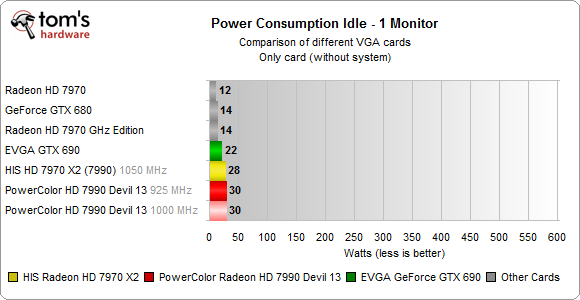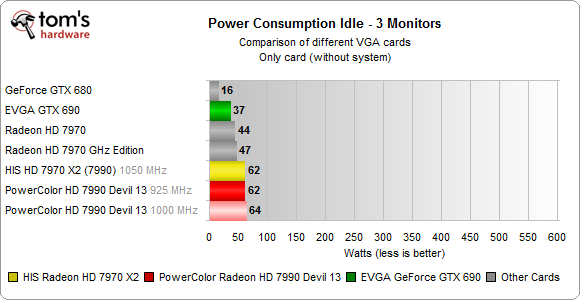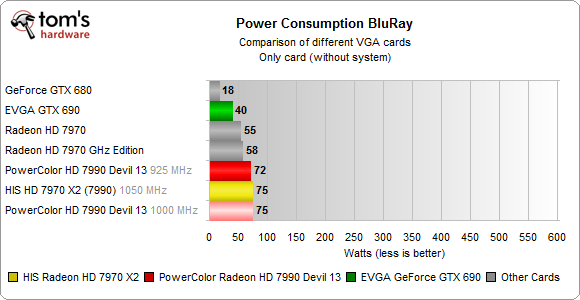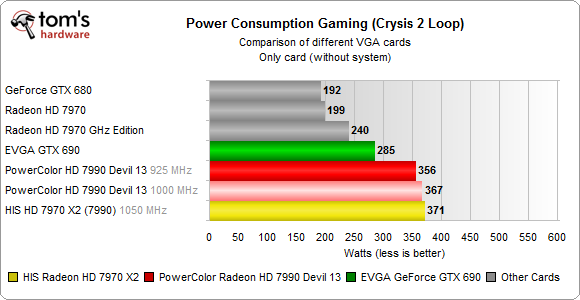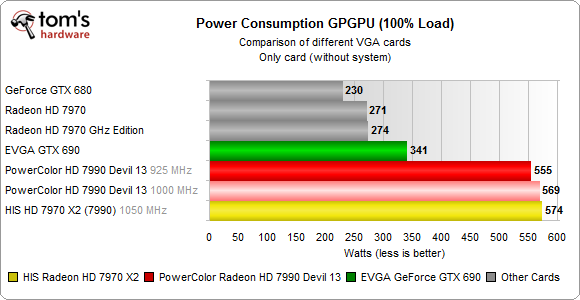Radeon HD 7990 And GeForce GTX 690: Bring Out The Big Guns
EVGA recently lent our German lab one of the GeForce GTX 690s we've had in the U.S. for months. The purpose? To pit against HIS' upcoming 7970 X2 and PowerColor's Devil13 HD7990, both dual-Tahiti boards vying to become the world's fastest graphics card.
Power Consumption
This will come as no surprise, but all three dual-GPU cards draw a lot of power.
AMD has long been known for exceptional idle power consumption during standby. Its ZeroCore feature suite is able to shut down nearly every part of the card during long periods of non-use. But if you're just sitting on the Windows Desktop, Nvidia's GeForce GTX 690 is actually the more energy-efficient dual-GPU solution.
Hooking up three screens requires that the AMD GPUs spin up to 500 MHz, increasing power consumption. Although the GeForce GTX 690's power use jumps as well, both dual-Tahiti-based boards more than double their single-monitor figures, making a couple of GK104s look downright environmentally-friendly.
AMD still hasn’t adjusted its drivers to keep power consumption under control during Blu-ray movie playback. The GeForce GTX 690 uses 18 W more in this workload than idle. HIS' 7970 X2 needs an extra 47 W for the same thing. That's simply not acceptable.
The cards based on two of AMD's highest-end graphics processors draw about 70 W more than EVGA's GeForce GTX 690 in gaming tasks. That's a fairly significant number, especially since performance is fairly comparable between them. It's not that we're worried about the cost of electricity. If you're buying one of these cards, a couple of bucks here or there won't matter. But all of that extra heat requires cooling, which is why EVGA's board is so elegant and the other two cards eat up three expansions slots each.
Under the load of a compute-heavy task, the HIS and PowerColor cards suck down power as if it were going out of style. These aren't total system power numbers, mind you. Both of those Radeon HD 7990-class cards are consuming 570 W on their own. Does your apartment lack a heater? Well, winter is coming, and either one of those boards will keep your room warm when it's cool outside.
Get Tom's Hardware's best news and in-depth reviews, straight to your inbox.
Current page: Power Consumption
Prev Page Micro-Stuttering: Dynamic V-Sync (AMD) Next Page Temperatures
Igor Wallossek wrote a wide variety of hardware articles for Tom's Hardware, with a strong focus on technical analysis and in-depth reviews. His contributions have spanned a broad spectrum of PC components, including GPUs, CPUs, workstations, and PC builds. His insightful articles provide readers with detailed knowledge to make informed decisions in the ever-evolving tech landscape
-
mayankleoboy1 IMHO, the GTX690 looks best. There is something really alluring about shiny white metallic shine and the fine metal mesh. Along with the fluorescent green branding.Reply
Maybe i am too much of a retro SF buff :) -
Ironslice What's the most impressive is that the GTX 690 was made by nVidia themselves and not an OEM. Very nice and balanced card.Reply -
thanks for the in depth analysis with adaptive V-sync and radeon pro helping with micro stutter.Reply
not to take away anything for the hard work performed; i would have liked have seen nvidia's latest beta driver, 310.33, included also to see if nvidia is doing anything to improve the performance of their card instead of just adding 3d vision, AO, and sli profiles. -
RazorBurn AMD's Dual GPU at 500+ Watts of electricity is out for me.. Too Much Power and Noise..Reply -
mohit9206 2 670's in sli is better than spending on a 690 and 2 7950's in Xfire is better than spending on a 7990. this way you save nearly $300 both waysReply
